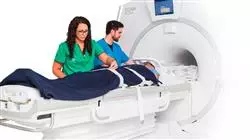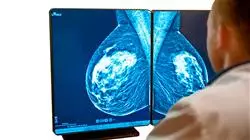University certificate
The world's largest faculty of medicine”
Introduction to the Program
Update yourself with the latest advances in Comprehensive Medical Oncology and expand your knowledge in cancer molecular biology, cutting-edge therapies and precision medicine”

The field of Comprehensive Medical Oncology is a constantly evolving specialty due to scientific advances, clinical challenges and the growing demand for comprehensive and multidisciplinary care in cancer management. Medical professionals and specialists dedicated to this specialty face a series of specific novelties and challenges that require constant updating.
Given this context, TECH has created the Advanced master’s degree in Comprehensive Medical Oncology, which offers an advanced and comprehensive update for those physicians and specialists interested in staying current in this constantly evolving specialty. This program provides a wide range of knowledge and skills necessary to address current clinical and scientific challenges in the field of Comprehensive Medical Oncology.
The rationale for participating in this program lies in the need to stay current in the constantly evolving field of Comprehensive Medical Oncology. Advances in the molecular understanding of cancer, the development of new therapies and treatment approaches, as well as the growing importance of comprehensive and multidisciplinary care in cancer management make it essential to have an updated and complete instruction in this specialty.
The Advanced master’s degree in Comprehensive Medical Oncology offers a wide range of topics, including the molecular biology of cancer, advances in diagnosis and treatment, genomic data mining techniques, psycho-oncological care, radiotherapy and psychological treatments in cancer and third generation therapies. Participants will have the opportunity to update their knowledge and gain a comprehensive, multidisciplinary perspective on cancer management.
An outstanding advantage of this program is that it is taught 100% online, which allows participants to access the Virtual Campus from anywhere and at any time, adapting to their schedules and professional responsibilities. In addition, the program uses innovative educational methodologies, such as clinical simulations and case discussions, which allow participants to practically apply the knowledge acquired and strengthen their clinical skills.
Delve into multidisciplinary approaches to comprehensive cancer management, addressing clinical, psycho-oncological and side effect management aspects”
This Advanced master’s degree in Comprehensive Medical Oncology contains the most complete and up-to-date scientific program on the market. The most important features include:
- The development of case studies presented by experts in oncology
- The graphic, schematic, and practical contents with which they are created, provide scientific and practical information on the disciplines that are essential for professional practice
- Practical exercises where self-assessment can be used to improve learning
- Its special emphasis on innovative methodologies in cancer management
- Theoretical lessons, questions to the expert, debate forums on controversial topics, and individual reflection assignments
- Content that is accessible from any fixed or portable device with an Internet connection
Delve into the latest techniques in the genomic era, use of Unix and Linux in bioinformatics, data analysis in Big Data projects with R for an updated and cutting-edge clinical practice”
Includes in its teaching staff professionals belonging to the oncology field, who pour into this program the experience of their work, in addition to recognized specialists from reference societies and prestigious universities.
The multimedia content, developed with the latest educational technology, will provide the professional with situated and contextual learning, i.e., a simulated environment that will provide an immersive learning experience designed to prepare for real-life situations.
This program is designed around Problem-Based Learning, whereby the student must try to solve the different professional practice situations that arise throughout the program. For this purpose, the professional will be assisted by an innovative interactive video system created by renowned and experienced experts.
Expand your knowledge in specific cancers such as breast, lung, ENT, colorectal, gynecological, urological, sarcoma, melanoma and brain cancers"

Analyze assessment and measurement instruments in psycho-oncology, communication with the oncology patient and bereavement management"
Why study at TECH?
TECH is the world’s largest online university. With an impressive catalog of more than 14,000 university programs available in 11 languages, it is positioned as a leader in employability, with a 99% job placement rate. In addition, it relies on an enormous faculty of more than 6,000 professors of the highest international renown.

Study at the world's largest online university and guarantee your professional success. The future starts at TECH”
The world’s best online university according to FORBES
The prestigious Forbes magazine, specialized in business and finance, has highlighted TECH as “the world's best online university” This is what they have recently stated in an article in their digital edition in which they echo the success story of this institution, “thanks to the academic offer it provides, the selection of its teaching staff, and an innovative learning method aimed at educating the professionals of the future”
A revolutionary study method, a cutting-edge faculty and a practical focus: the key to TECH's success.
The most complete study plans on the university scene
TECH offers the most complete study plans on the university scene, with syllabuses that cover fundamental concepts and, at the same time, the main scientific advances in their specific scientific areas. In addition, these programs are continuously being updated to guarantee students the academic vanguard and the most in-demand professional skills. In this way, the university's qualifications provide its graduates with a significant advantage to propel their careers to success.
TECH offers the most comprehensive and intensive study plans on the current university scene.
A world-class teaching staff
TECH's teaching staff is made up of more than 6,000 professors with the highest international recognition. Professors, researchers and top executives of multinational companies, including Isaiah Covington, performance coach of the Boston Celtics; Magda Romanska, principal investigator at Harvard MetaLAB; Ignacio Wistumba, chairman of the department of translational molecular pathology at MD Anderson Cancer Center; and D.W. Pine, creative director of TIME magazine, among others.
Internationally renowned experts, specialized in different branches of Health, Technology, Communication and Business, form part of the TECH faculty.
A unique learning method
TECH is the first university to use Relearning in all its programs. It is the best online learning methodology, accredited with international teaching quality certifications, provided by prestigious educational agencies. In addition, this disruptive educational model is complemented with the “Case Method”, thereby setting up a unique online teaching strategy. Innovative teaching resources are also implemented, including detailed videos, infographics and interactive summaries.
TECH combines Relearning and the Case Method in all its university programs to guarantee excellent theoretical and practical learning, studying whenever and wherever you want.
The world's largest online university
TECH is the world’s largest online university. We are the largest educational institution, with the best and widest online educational catalog, one hundred percent online and covering the vast majority of areas of knowledge. We offer a large selection of our own degrees and accredited online undergraduate and postgraduate degrees. In total, more than 14,000 university degrees, in eleven different languages, make us the largest educational largest in the world.
TECH has the world's most extensive catalog of academic and official programs, available in more than 11 languages.
Google Premier Partner
The American technology giant has awarded TECH the Google Google Premier Partner badge. This award, which is only available to 3% of the world's companies, highlights the efficient, flexible and tailored experience that this university provides to students. The recognition as a Google Premier Partner not only accredits the maximum rigor, performance and investment in TECH's digital infrastructures, but also places this university as one of the world's leading technology companies.
Google has positioned TECH in the top 3% of the world's most important technology companies by awarding it its Google Premier Partner badge.
The official online university of the NBA
TECH is the official online university of the NBA. Thanks to our agreement with the biggest league in basketball, we offer our students exclusive university programs, as well as a wide variety of educational resources focused on the business of the league and other areas of the sports industry. Each program is made up of a uniquely designed syllabus and features exceptional guest hosts: professionals with a distinguished sports background who will offer their expertise on the most relevant topics.
TECH has been selected by the NBA, the world's top basketball league, as its official online university.
The top-rated university by its students
Students have positioned TECH as the world's top-rated university on the main review websites, with a highest rating of 4.9 out of 5, obtained from more than 1,000 reviews. These results consolidate TECH as the benchmark university institution at an international level, reflecting the excellence and positive impact of its educational model.” reflecting the excellence and positive impact of its educational model.”
TECH is the world’s top-rated university by its students.
Leaders in employability
TECH has managed to become the leading university in employability. 99% of its students obtain jobs in the academic field they have studied, within one year of completing any of the university's programs. A similar number achieve immediate career enhancement. All this thanks to a study methodology that bases its effectiveness on the acquisition of practical skills, which are absolutely necessary for professional development.
99% of TECH graduates find a job within a year of completing their studies.
Advanced Master's Degree in Integrative Medical Oncology
TECH Global University of Technology presents you with the Advanced Master's Degree in Comprehensive Medical Oncology, designed to provide you with cutting-edge virtual training in the field of oncology. With the increasing number of cancer cases in the world's population, the demand for highly trained professionals in comprehensive cancer management has become more relevant than ever. In our program, you will receive comprehensive training in the diagnosis, treatment and follow-up of cancer, with special emphasis on the latest technologies and therapeutic approaches. In addition, topics such as personalized medicine, immunotherapy and clinical research in oncology will be addressed, so that you can develop the skills necessary to meet the current and future challenges of the oncology field.
TECH offers you the opportunity to develop the skills necessary to meet the current and future challenges of the oncology field.
TECH offers you a high-level educational experience, with a practical and up-to-date approach. Our team of oncology experts will guide you through the latest advances in cancer diagnosis and treatment, using innovative teaching methodologies and cutting-edge virtual tools. You will learn to manage complex clinical cases, interpret laboratory and radiological tests, and develop treatment strategies based on the most up-to-date scientific evidence. With TECH you will be prepared to face the professional challenges of medical oncology today.







